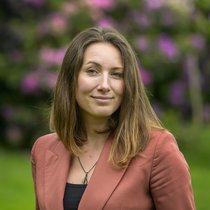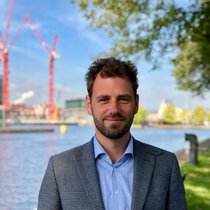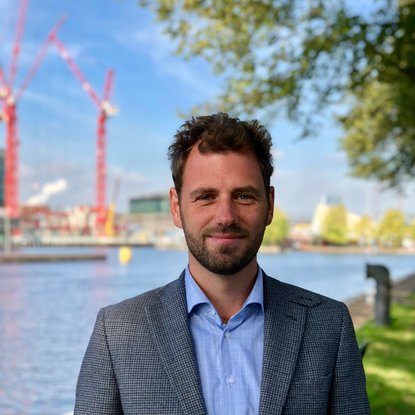*This article was published in Dutch on ibestuur.nl in October 2025. With iBestuur’s permission, we translated the article into English.
A new partnership of knowledge institutions aims to help public organizations increase their digital independence. What can we expect from the Digital Autonomy Competence Center (DACC)? iBestuur spoke with Thijs Turel, one of the initiators of the DACC, and Ellen Mok, who previously founded the Digital Think Tank. “We are looking for the issues that concern many organizations to develop scientifically based tools for them. At some point, you want to be able to say what really works and what may be counterproductive.”
The center is an initiative of AMS Institute, VNG, Digicampus, the Ministry of the Interior and Kingdom Relations, TU Delft, and the Municipality of Amsterdam. Thijs Turel works as a program developer at the Amsterdam Institute for Metropolitan Solutions, which was founded about twelve years ago by TU Delft, Wageningen University, and MIT at the request of the Municipality of Amsterdam. “We help the city of Amsterdam with innovation issues, trying to apply knowledge from science. I had been working on responsible digital technology for a while; just under a year ago, we started working on the theme of digital autonomy.”
Ellen Mok has been recruited as an external consultant for the DACC. She previously founded Digitale Doetank, a company that helps governments and businesses purchase more European technology. “What we develop with public money, we also make available to society. That mission and vision align with the DACC's knowledge sharing,” says Mok.
Just getting started
The DACC is still in its startup phase. This initial phase marks an important moment, namely the concrete financing of the competence center. There is no website yet. “We are working on it,” says Turel, “but we are still looking for the technology we want to use for this. Of course, you don't want a quick plug-and-play WordPress solution, because then we would be dependent on one of the big IT companies we don't want to be dependent on.”
It's also a quest for Turel and Mok. Mok laughs: "Then you experience firsthand what organizations go through when they want to switch from American Big Tech technology to European, more sovereign technology. Big Tech technology is easy to get into, so there is very little resistance. But if you want to get out, the resistance becomes very high. And with European parties, you see the high resistance to getting in. But once it's well organized, you're very flexible and things are much easier to adapt."
“We are developing a maturity model. This will enable you to assess processes based on their degree of digital sovereignty.”
Thijs Turèl
Program Developer & Teamlead
Tools
Several tools are currently in development. “We are working on a project we call the ‘digital autonomy performance ladder,’” says Thijs Turel. “Compare it to the CO₂ performance ladder, or what you see in Albert Heijn, the Nutri-scores. It's a management tool that allows you to report on digital autonomy. Everyone must measure the same thing, so you can see how your organization is doing.”
“We are also developing a maturity model. This allows you to score processes based on the degree of digital sovereignty.” This model encompasses aspects such as the degree of knowledge retention, supplier requirements, and opportunities for switching between them. “Based on the scores, you can then identify areas for improvement.”
Thirdly, the DACC has launched a study into the barriers and ways in which, for example, municipalities can jointly purchase technology. Turel: 'The Association of Netherlands Municipalities recently passed a resolution stating they want to purchase 80 percent of generic technology jointly. How can they ensure that this collaboration runs smoothly? How can they set this up properly with each other from the outset?'
Identifying problems
The DACC is seeking overlaps in the challenges that organizations encounter during their development toward greater digital autonomy. “By identifying the problems, you get a good picture of the current situation,” says Turel. He cites municipal procurement as an example. ‘You can put the work on the market in such a way that only one or two parties can respond. You can also divide it into smaller blocks, so many more suppliers can sign up. We are now looking at the lessons learned for multiple procurement levels.’
Academic basis
TU Delft is involved in the DACC; Professor of GovTech & Innovation Nitesh Bahrosa and Professor of ICT & Governance Marijn Jansen are mentioned. Turel says that they want to attract more universities. The DACC intends to base the development of its tools on academic knowledge. “At some point, you have to be able to say what works towards digital autonomy, and what doesn't or is counterproductive.”
“We want to bring scientific knowledge to society and practical experience to the DACC.”
Ellen Blok, Founder Digital Think Tank

“We want to bring scientific knowledge to society and practical experience to the DACC; that is also my role,” says Ellen Mok. “I receive requests for knowledge products from the Digital Think Tank. These are questions and a network that I can bring to the DACC. I hope we will have a library of applicable knowledge products within a year, so that we can serve as a starting point for organizations in their search for what digital autonomy means to them. We can provide them with insights and tools, and they will contribute to the collective knowledge sharing.”
Autonomy Washing
We need to watch out for ‘autonomy washing’, warns Turel. ‘Market players will claim that their solution is the most autonomous.’ However, governments can also engage in autonomy washing. "I can imagine that it is also in the interest of governments to say that they have things well organized. I am glad we have gained critical capacity by attracting academic knowledge. That we can tell, for example: 'Yes, that part of the program has been solved, but you have left these parts out of consideration for a moment, and you really need to do something about that.
Organizations need to look at the whole issue of digital autonomy and not get lost in the autonomy of a single component or stack layer," he concludes.

